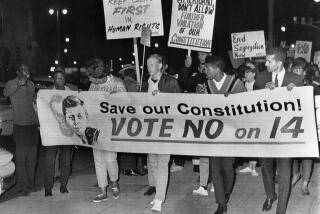Bush Salutes Civil Rights Act at 40
- Share via
WASHINGTON — President Bush on Thursday led a White House celebration of the 40th anniversary of the landmark Civil Rights Act, which outlawed racial discrimination in public facilities.
Speaking in the East Room, the most formal setting in the White House, Bush called the day “a great anniversary of justice and equality in America,” adding that the law had been “a long time in coming.”
The president also said that before the law passed, “the conscience of America had to be awakened ... stirred by men and women who held sit-ins at lunch counters, who rode the buses on freedom rides, who endured and overcame the slurs and the fire hoses and the burning crosses.”
One of those activists, Rep. John Lewis (D-Ga.), was noticeably absent from the event. Lewis, once a student civil rights organizer, was the youngest speaker at the historic March on Washington in 1963. An aide to Lewis said Thursday that the White House did not send “notification” of its event to Lewis’ office until midday Tuesday, and by then the congressman had commitments in Atlanta.
Also absent was Rep. Elijah E. Cummings (D-Md.), chairman of the Congressional Black Caucus, which has had a rocky relationship with the White House. His office also said he received his notification too late.
Democrats, led by the campaign of Massachusetts Sen. John F. Kerry, the party’s presumed presidential nominee, and party Chairman Terry McAuliffe, criticized Bush’s civil rights record.
“When it comes to civil rights, the gap between what George Bush likes to tout and what he’s actually done is enormous,” said Phil Singer, a Kerry campaign spokesman. “The fact is that the president has turned the clock back on civil rights.”
The campaign said Bush had appointed judges to the federal bench “who want to roll back civil rights,” and that the administration had supported judicial efforts to block affirmative action in university admissions.
“The Bush administration has failed to make civil rights a priority,” McAuliffe said. “They have failed in housing, with discrimination complaints reaching an all-time high. They have failed American women by not challenging many sex discrimination cases in employment.”
At the White House, spokesman Scott McClellan dismissed the criticism as campaign rhetoric and predicted Bush would improve his showing among African Americans in November.
Four years ago, Bush won 9% of the black vote.
In 1994, Bush won 15% of the black vote when he ran for governor of Texas. Four years later, his support among black voters in Texas jumped to 27%.
“After he had been in office and the people saw his record of accomplishment in terms of providing equal opportunity for all people in the state, those numbers went up significantly,” McClellan said.
He added that Bush’s civil rights achievements included the passage of the No Child Left Behind education reform act, “vigorous enforcement” of civil rights laws by the Justice Department, and setting a goal to increase minority homeownership by 5.5 million households by the end of this decade.
Bush spoke in the same East Room where President Lyndon B. Johnson had signed the law 40 years ago. Among those in the audience Thursday were Luci Baines Johnson Turpin, daughter of the former president; Thurgood Marshall Jr., son of the late Supreme Court justice and civil rights legend; and Jack Valenti, a onetime Johnson aide.
To mark the event, the law’s title page and signature page, on loan from the National Archives, were displayed at the White House, as was one of the pens that Johnson used to sign the act.
The legislation banned racial barriers in all public establishments, outlawed workplace discrimination, strengthened voting rights and created the U.S. Equal Employment Opportunity Commission.
Also in attendance was former Health and Human Services Secretary Louis W. Sullivan, who graduated in 1954 from Morehouse College in Georgia but attended medical school at Boston University because of discriminatory practices in his own state. Years later, he became dean of the Morehouse School of Medicine.
More to Read
Get the L.A. Times Politics newsletter
Deeply reported insights into legislation, politics and policy from Sacramento, Washington and beyond. In your inbox twice per week.
You may occasionally receive promotional content from the Los Angeles Times.










